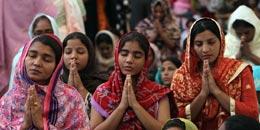Canada steps up to protect Pakistan’s minority groups

Canada has stepped this month to tell the Nawaz Sharif government that it should take “swift” and “unerring” steps to ensure that terrorists cease attacks on Pakistan’s religious and ethnic communities.
Canada is just not pointing out the obligations to the government but also taking an extra step to help Pakistan through two projects, reported Pakistannews.com.
These projects “which promote dialogue and greater recognition of Pakistan’s religious diversity, (which) will encourage discussion within the Pakistani Parliament and broaden awareness of religious freedom.”
One of the projects of $1,000,000 beginning in 2014, aims to generate debate at the highest level in Pakistan’s policy-making institutions; to implement rights guaranteed by the Pakistani Constitution; to advocate for positive change on inclusiveness issues; and to disseminate resource materials.
The objective of the second project is for one-year ($200,000) to document injustices faced by non-Muslim Pakistanis and to examine the status of freedom of religion among Pakistanis, who are guaranteed this right under Pakistan’s Constitution. The project deliverables will include research reports, video recordings of testimony by members of religious minority communities, consultations with stakeholders and informed policy advocacy with parliamentarians. Participants in the project will seek to identify practical approaches to increase awareness of the plight of religious minorities by liaising with local journalists, activists and academics.
Pakistan's impoverished and peaceful Christian community has endured mob rampages, blasphemy charges, and was largely spared the ravages of suicide bombings, till last month. Suicide bombings on September 22 at Peshawar's All-Saints Church, which is designed like a mosque to reflect inter-faith harmony, killed 83 worshippers and injured more than 125, bringing to focus how the danger minorities face in the militancy raging across Pakistan. With almost a bomb a day since Pakistan Muslim League-Nawaz (PML-N) government took over in June, the church was indeed a soft target, wrote Sajjad Ashraf , an adjunct professor at the Lee Kuan Yew School of Public Policy, National University of Singapore
Since independence in 1947 minority numbers have fallen from about a quarter of Pakistan population to 3.7%. Most Hindus and Sikhs moved to India following ethnic riots at the time of partition. Many still do. The separation of East Pakistan, now Bangladesh, where Hindus formed one-fifth of the population reduced minority numbers further. Christians, who now constitute 1.6% of the population, live in a state of fear and are left to do most menial jobs.
Weakened minorities look towards the government to restore and protect their places of worship and other properties, which the land mafia continues to expropriate, abetted by state functionaries, for commercial purposes.
Forcible conversion of teenage Hindu girls and their marriage to Muslim boys is reportedly common in Sindh, where Hindus are mostly concentrated. Despite Supreme Court suo moto intervention last year, none of the girls could go back for the fear of retribution, community leaders have claimed.
Christians are routinely accused of blasphemy over minor personal disputes. Aasia Bibi's case grabbed world headlines in 2011 following the murder of Punjab governor Salman Taseer, by his own guard, for publicly stating that the law had been abused in Aasia Bibi's case. His murderer was sentenced to death and is a hero to a substantial number of Pakistanis.
Pakistan witnessed heart-wrenching scenes when the Hazaras, a Shi'ite sect sat in sub-zero temperatures in Quetta for four days refusing to bury 100 of their dead. Shi'ites blame the killing of nearly 400 from among them during the past two years on the banned Sunni militant group, Lashkar-e-Jhangvi. The Ahmediya community, excommunicated in 1974 from the pale of Islam, is the target of some of the worst attacks. Even Ahmediya graves were desecrated in Lahore last year.
While law provides for equality and protection, state machinery stands by passively as hate crimes increase against the minorities.
Minorities now expect little protection from the state. The mystery for them is not the identity of their attackers. It is answering why the Pakistani state cannot - or will not - protect them? "Pakistani Christians have to constantly look over our shoulder," laments a Christian digital communicator who is based in Dubai.
Andrew Bennett, Canada’s Ambassador for Religious Freedom, who just concluded a week-long visit to Pakistan where he announced these two projects to be supported by the Religious Freedom Fund.
“Pakistan is a country with a multi-faith and multicultural character, which is similar in ways to Canada’s,” said Bennett. “We remain very concerned by repeated incidents of religiously motivated violence in Pakistan and the callous disregard of extremists for the rights of individuals of all faiths to practice their religion in peace and security, “ he said in a statement from the Embassy of Canada.
Earlier the Canadian Foreign Minister John Baird was quoted as saying, “Terrorist attacks against Pakistan’s religious and ethnic communities highlight the need for the Pakistani government to take swift and unerring steps to bring terrorist groups, including those that equip, train and deploy them, to justice.”
“Canada will continue to work with its allies to help the people of Pakistan address the challenges they face and to encourage freedom throughout the region,” he said in a statement.
The Religious Freedom Fund, which is managed by the Office of Religious Freedom at Foreign Affairs, Trade and Development Canada, aims to increase the capacity of organizations in various countries to directly address violations of freedom through a variety of activities, including awareness-building initiatives, legal and legislative training and support for the promotion of freedom of religion and pluralism.
Leave a comment









